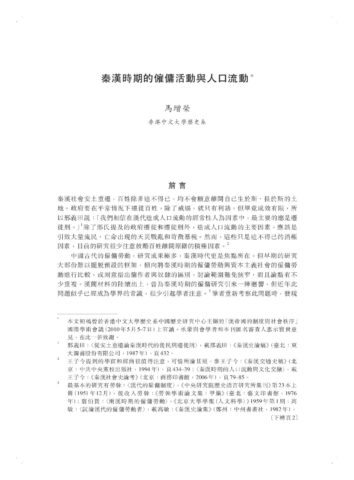Hired Activities and Movement of Population in Qin-Han Periods
Residents in Qin-Han rural society had close relationship with their land, kinship, and neighborhood. Leaving home was regarded as full of uncertainty and fear due to the difficulty and danger of transportation. Thus, residents were not easily intended to depart from their home or take a long distance journey. Their mobility was limited and their movement was confined to a small area and maintained at the xiangli 鄉里 level. The concept of antu zhongqian 安土重遷 (contenting with the land and cautious about migration) is treated as one of the characteristics of Qin-Han rural society in modern scholarship.
Concerning the occurrence of the movement of population (人口流動), modern scholarship often places emphasis on the role of the government and the effect of civil war and natural disaster, all of which can be considered as passive factors, pushing people to leave their land reluctantly. This paper examines the active factor which could encourage the movement of population in Qin-Han rural society. Here the author wishes to argue the importance of the hired activities (僱傭活動) which is underrated by modern scholars. Hiring labors was widely adopted and treated as one of the most important trading methods in Qin-Han labor market. Hired activities appeared when there was high demand for laborers and low qualification requirements for acceptance, hence creating many job opportunities. Residents departing from their homes or travelling a long distance could earn their living by filling such job vacancies. The anxieties and fear of leaving home were thereby relieved. It would give rise to the movement of population.
However, the government’s objective was to keep the residents staying on their land and devoting to agriculture. The appearance of liuyong 流傭 (migrant laborers) often frustrated the ruler and was an important issue in local administration, but the government was not intended to eradicate the hired activities completely. This author suggests two ways to comprehend the government’s attitude. First, the government was the biggest employer and demander in the hired labor market. Second, the hired activities had charity function which can alleviate the social crisis during the hard times of civil war and natural disaster. From the ruler’s point of view, an ideal measure to handle the hired activities was to monitor and keep the laborers in check to the extent that they could benefit the rule of the empire, not disturbing the order of the society.
Facts
- Author:
- Regions:
- China
- Published:
- A4 Pages:
- 28
- Download Size:
- 1 MB
- Estimated Reading Time:
- 01:10 h
 Tsang Wing Ma
Tsang Wing Ma